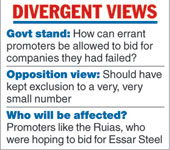 New Delhi: The Modi government appears to have finally slammed the doors on promoters of companies referred for bankruptcy resolution to the national company law tribunal (NCLT) from bidding for these assets.
New Delhi: The Modi government appears to have finally slammed the doors on promoters of companies referred for bankruptcy resolution to the national company law tribunal (NCLT) from bidding for these assets.
On Tuesday, finance minister Arun Jaitley once again hardened his stand on the issue during the debate in the Rajya Sabha when he indicated that the government was not comfortable with the idea of allowing the errant promoters to bid for the companies that they had run into the ground.
"The company has gone into insolvency. Once the bidding starts, the same promoters come back and want to bid again to get the company. Here, not only the banks but the commercial creditors and unsecured creditors also may take some haircut and the same management would come back into management. The same set of people would come back into management. Nothing would change. Those who ran the company down to the ground and to insolvency would be back in management after paying 40 or 50 or 60 or 70 per cent of the amount. Nothing would change except that the creditors have taken a haircut. Now, is this kind of a system to be permitted in the Indian insolvency proceedings? I am glad to know that not one person in this House has said that this should be permitted. This House, in one voice, has said that these people should be excluded."
Jaitley's statement, which was made during his reply to the debate on the Insolvency and Bankruptcy Code (Amendment) Bill which was later passed by the Rajya Sabha, means that promoters such as the Ruias who were hoping to bid for Essar Steel after paying overdue interest of Rs 3500-4500 crore on the steel maker's NPA debt may not be allowed to do so.
Back in November, Jaitley had said at a global seminar that promoters would be allowed to bid for their companies during the resolution process if they paid their dues in the their NPA accounts.
Essar Steel and 11 other companies were referred to the NCLT in July last year and the 180-day initial deadline for bankruptcy resolution runs out on January 29. However, the Code does provide for another 90-day extension till April 29 after which the company is supposed to go into liquidation if no resolution is found.
"Let us see the experience of these 12 companies which, in the first instance, have now come up before the Board. In any case, there is a corresponding amendment to Section 30 of the Bill which is ... that the Committee of Creditors is not bound to accept any and every bid.... Ultimately, it is the creditors who have to decide what their future is. Whether they want a particular haircut or they don't want a particular haircut, whether a bid is viable, reasonable or not. It is the creditors who are going to decide under this Act," Jaitley said.
Earlier in the day, former finance minister P. Chidambaram had expressed grave concern over clauses in the bill that excluded a number of people from the bidding process.
"I think one should have been a little more rigorous in the exclusion clauses. One should have kept exclusion to a very, very small number which definitely must be excluded. But I am afraid by making the clauses so broad, so over-inclusive, practically everybody in the financial world is likely to be excluded," Chidambaram said.
Chidambaram's biggest concern that "a person convicted for any offence punishable for imprisonment for two years or more" would be kept out of the bidding process.
In his response, Jaitley justified the exclusion clause on the ground that section 164 of the Companies Act 2013 bars anyone convicted for more than six months from becoming a director of a company. "Once he can't be a director of a company, I don't see any reason why he should be allowed (to bid)," the finance minister said.
One big concern raised by a number of members, including Jairam Ramesh of the Congress and D. Raja of the CPI, was the fact that the bankruptcy resolution process threw up the prospect where banks and other creditors might have to take a haircut of as much as 75 per cent - creating a situation where those allowed to bid for these stressed assets would be able to snap them up for a song.
Ramesh said it was "worrying and disturbing" that haircuts have been in excess of claim value of NPAs in the first three cases of insolvency resolution scheme.
"In the first case, the haircut was 76 per cent, in second case, it was 74 per cent and in the third case, it was 80 per cent. Is this an acceptable situation? Are these aberrations or are they going to be a norm," Ramesh asked.
Anand Shama interjected: "Is there any benchmark or any limit on how big the haircut should be (in the case of the 12 companies that form the first batch o companies referred to the NCLT)?"
Jaitley replied: "This decision is neither taken by the government nor by the bureaucracy, nor by the political establishment. This has to be taken by the creditor. Therefore, these commercial transactions, whether the creditor must allow hundred per cent of it to go down the drain if I may use that word - or recover 70 per cent or 80 per cent or 60 per cent, the Committee of Creditors will decide this. And if the bid is inadequate, then Section 30 now says that it has to be feasible and viable. If the creditors feel that some bid is exceptionally low, the creditor will say, 'Sorry, we are going for re-bidding'."










